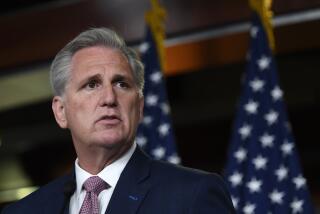Obama goads Republicans to present alternative jobs plan
- Share via
Reporting from Washington — As the Senate prepares for a vote on President Obama’s jobs proposal Tuesday, the president is calling on his Republican opponents not just to explain their no votes but to offer a better alternative.
Obama’s $447-billion jobs plan, with its mix of tax breaks for workers and new spending to hire teachers or build roads and bridges, would add 1.9 million jobs and boost gross domestic product by 2 percentage points, according to independent economists.
Republicans largely oppose the measure as they pursue their own jobs agenda: lowering business taxes and rolling back what the GOP calls “job-killing” regulations. But they have been unable or unwilling to say how many jobs they think they can add this way.
“Do they have a plan that would have a similar impact?” Obama asked at a news conference last week. “The answer we’re getting right now is, ‘Well, we’re going to roll back all these Obama regulations.’ …Does anybody really think that that is going to create jobs right now?”
Tuesday’s vote is procedural, requiring 60 to pass. Democrats control 53 seats, and some of them may vote no because the jobs bill would be funded by a 5.6% surtax on people earning more than $1 million a year.
The Republican-led House is not expected to consider the president’s legislation, at least not in its entirety. Instead, the chamber is working on the GOP jobs plan — a 10-pack of bills to halt new regulations the party contends harm businesses. Mostly they target clean-air rules from the Environmental Protection Agency, but they also would roll back workplace regulations and elements of Obama’s healthcare law.
Supporters say the Republican approach would save hundreds of thousands of jobs and grow the economy by easing the uncertain business climate. But GOP leaders have been hesitant to put hard numbers on their claims.
“You are asking us to pin down an exact number of jobs,” Republican Rep. Eric Cantor of Virginia, the House majority leader, said recently. “Let’s stop overpromising and underperforming, and why don’t we begin to set the sights in a reasonable way?”
Republicans also support business tax breaks and trade agreements the White House has proposed with South Korea and other countries.
But economists say little Washington does this fall will swiftly or substantially improve the nation’s persistently high 9.1% unemployment rate.
“The Republican proposals are generally good policy — you can’t find fault with the idea that we should eliminate or try to scale back regulations that are onerous,” said Mark Zandi, chief economist at Moodys.com, who has advised Democrats and Republicans. “But I don’t think they make a meaningful difference on the economy immediately. The economy is struggling to avoid recession.”
Zandi estimated that Obama’s proposal could add jobs and shave 1 percentage point off the unemployment rate.
Industry groups, economists and Republican lawmakers offer wide-ranging views on the economic effects of regulatory changes.
Manufacturing industries estimate that hundreds of thousands of jobs could be saved by postponing rules that limit pollution from cement kilns and other sources, as Republicans advocate.
One report from IHS Global Insight for the boiler industry estimated that every $1 billion the industry spent complying with new air rules could result in 16,000 lost jobs and a $1.2-billion reduction in the GDP.
The EPA says industry estimates are routinely exaggerated and the clean-air rules can create jobs.
To be sure, Republicans do not want to fall into the trap the White House set for itself when it said in 2009 that its economic recovery program would keep the unemployment rate from exceeding 8%. That has haunted the Obama administration.
The White House tried to steer clear of another oversell last month when it rolled out the jobs plan, relying instead on independent economists to assess it.
More to Read
Get the L.A. Times Politics newsletter
Deeply reported insights into legislation, politics and policy from Sacramento, Washington and beyond. In your inbox twice per week.
You may occasionally receive promotional content from the Los Angeles Times.











